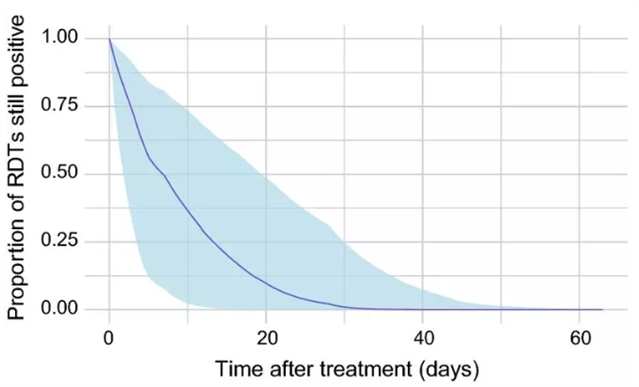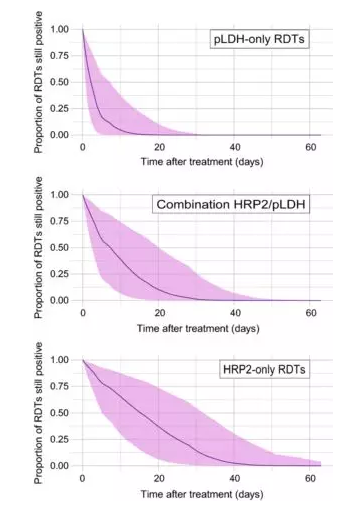论文标题:How long do rapid diagnostic tests remain positive after anti-malarial treatment?
期刊:Malaria Journal
作者:Ursula Dalrymple et al
发表时间: 2018/6/8
数字识别码:10.1186/s12936-018-2371-9
原文链接:https://malariajournal.biomedcentral.com/articles/10.1186/s12936-018-2371-9?utm_source=WeChat&utm_medium=Social_media_organic&utm_content=CelZha-BMC-Malaria_Journal-Medicine-China&utm_campaign=AJL_AWA_BSCN_CZ_BMCblog_malaria?utm_source=WeChat&utm_medium=Social_media_organic&utm_content=DaiDen-BMC-Malaria_Journal-Biology-China&utm_campaign=AJL_USG_BSCN_DD_MJ_BLOG
确诊,是治疗疟疾患者的第一步。然而最近一些研究发现并非所有疟疾诊断测试方法的效果都相同,包括快速诊断测试(RDT)在内的一些测试可能在某些患者群体中显示假阳性结果。发表在Malaria Journal上的一项新研究探索了识别特定疟疾抗原的不同疟疾快速诊断测试的准确性。

人类疟疾寄生虫已经对几乎每种治疗药物都产生了一定的抗药性,特别是最常用的治疗——ACT。
为了遏制青蒿素联合治疗(artemisinin combination therapy,ACT)抗药性的进一步蔓延,2010年世界卫生组织建议所有疑似疟疾病例接受抗疟疾药物之前进行寄生虫相关诊断(而不是基于发烧等外部症状进行假定治疗)。
这对大多数地方诊所来说是一个挑战,因为基于寄生虫的诊断主要依赖于在显微镜下观察血液样本。该过程需要昂贵的设备和培训,并且很耗时,对于小规模的健康诊所既不方便也不划算。
幸而,快速、简便且便宜的快速诊断测试(rapid diagnostic tests,RDT)已被研制出。这些测试类似于妊娠测试,当遇到疟疾感染的血液样本时,显示器上会出现指示带。RDT的工作原理是检测由疟原虫产生的抗原(被感染的蛋白质的总称),并诱导化学反应,使指示带发出荧光。
2010年至2015年,全球RDT制造商的销售量从9千万增加到2.7亿,而2015年,RDT用于74%疑似疟疾病例的诊断测试。通过在不确认寄生虫存在的情况下减少抗疟疾药物的使用,过度治疗的比率下降,且抗药性产生的可能性降低。
在成功进行抗疟疾治疗后,疟疾寄生虫从血液中清除,治疗后的个体在几天内开始感觉变好。
然而此时,使用RDT进行诊断的一个问题出现了。新近清除的疟疾寄生虫产生的抗原在治疗一段时间后仍然存在于血液中,并且这种抗原持续时间变化很大。因此,如果对最近接受治疗的个体进行检测,得到的RDT检测结果仍然可能显示为阳性,尽管他们没有感染疟疾。
在此期间,如果个体再次发烧,则可能会出现其他问题。如果测试结果仍为阳性,临床医生可能认为他们再次感染疟疾,但也可能是感染了非疟疾疾病而引起发烧(例如登革热病毒或结核病),但是之前疟疾感染残存的抗原量仍足以使RDT检测呈阳性。
了解抗原持续时间对于正确解释新近治疗个体的RDT至关重要,并降低临床医生对非疟疾发热导致ACT抗药性处置失当的可能性。
牛津大学“疟疾地图项目”最近于Malaria Journal发表了一篇论文,作者系统地梳理了有关治疗后RDT阳性持续时间的研究,并利用贝叶斯生存模型分析数据,以测量治疗后RDT持续阳性的时间。

成功治疗疟疾后60天内RDT仍为阳性的预期比例。
作者发现,大约一半RDT结果在治疗后超过一周仍为阳性,一小部分在治疗后超过三周仍为阳性。
目前有多种形式的RDT,通常能测试两种疟疾抗原之一或全部:富含组氨酸的蛋白质II(HRP2)和乳酸疟原虫脱氢酶(pLDH)。该研究发现,在成功进行抗疟疾治疗后,在这两种类型的RDT中,检测HRP2的RDT显示持续阳性的时间比检测pLDH的RDT(或同时检测HRP2和pLDH的组合RDT)长很多。

成功治疗疟疾后60天内不同类型RDT测试仍为阳性的预期比例。
在这些发现之外,该研究还分析了基于抽样患者年龄范围的研究,从中发现儿童持续阳性的持续时间比成人患者长。这很可能是由于儿童疟疾感染经常与更高的血液寄生虫密度相关,而高疟疾暴露区域的成年人通常会对疟疾产生免疫反应,从而降低血液寄生虫密度。
该研究的结果表明,临床医生应慎重对待新近治疗患者的RDT阳性结果,特别是年轻患者且仅使用了检测HRP2的RDT。
幸运的是,随着世界上大多数地区的疟疾患病率持续下降,人类成功治疗疟疾后再感染的可能性越来越小。RDT在很大程度上促进了这一发展,其正确使用将有助于延续这一趋势。疟疾的过度诊断导致全球抗疟疾药物的过量使用和非疟疾发烧经常性的处置失当。在个体层面,为患者提供可能的最佳诊断从而实现最理想的治疗效果最为重要。
摘要:
Background
Rapid diagnostic tests (RDTs) are increasingly becoming a paradigm for both clinical diagnosis of malaria infections and for estimating community parasite prevalence in household malaria indicator surveys in malaria-endemic countries. The antigens detected by RDTs are known to persist in the blood after treatment with anti-malarials, but reports on the duration of persistence (and the effect this has on RDT positivity) of these antigens post-treatment have been variable.
Methods
In this review, published studies on the persistence of positivity of RDTs post-treatment are collated, and a bespoke Bayesian survival model is fit to estimate the number of days RDTs remain positive after treatment.
Results
Half of RDTs that detect the antigen histidine-rich protein II (HRP2) are still positive 15 (5–32) days post-treatment, 13 days longer than RDTs that detect the antigen Plasmodium lactate dehydrogenase, and that 5% of HRP2 RDTs are still positive 36 (21–61) days after treatment. The duration of persistent positivity for combination RDTs that detect both antigens falls between that for HRP2- or pLDH-only RDTs, with half of RDTs remaining positive at 7 (2–20) days post-treatment. This study shows that children display persistent RDT positivity for longer after treatment than adults, and that persistent positivity is more common when an individual is treated with artemisinin combination therapy than when treated with other anti-malarials.
Conclusions
RDTs remain positive for a highly variable amount of time after treatment with anti-malarials, and the duration of positivity is highly dependent on the type of RDT used for diagnosis. Additionally, age and treatment both impact the duration of persistence of RDT positivity. The results presented here suggest that caution should be taken when using RDT-derived diagnostic outcomes from cross-sectional data where individuals have had a recent history of anti-malarial treatment.
阅读论文原文,请访问
https://malariajournal.biomedcentral.com/articles/10.1186/s12936-018-2371-9?utm_source=WeChat&utm_medium=Social_media_organic&utm_content=CelZha-BMC-Malaria_Journal-Medicine-China&utm_campaign=AJL_AWA_BSCN_CZ_BMCblog_malaria?utm_source=WeChat&utm_medium=Social_media_organic&utm_content=DaiDen-BMC-Malaria_Journal-Biology-China&utm_campaign=AJL_USG_BSCN_DD_MJ_BLOG
期刊介绍:Malaria Journalis aimed at the scientific community interested in malaria in its broadest sense. It is the only journal that publishes exclusively articles on malaria and, as such, it aims to bring together knowledge from the different specialities involved in this very broad discipline, from the bench to the bedside and to the field. Malaria Journal offers a fast publication schedule while maintaining rigorous peer-review; this is achieved by managing the whole of the publication process electronically, from submission to peer-review.
2017 Journal Metrics
Citation Impact
2.845 - 2-year Impact Factor
3.017 - 5-year Impact Factor
1.090 - Source Normalized Impact per Paper (SNIP)
(来源:科学网)
特别声明:本文转载仅仅是出于传播信息的需要,并不意味着代表本网站观点或证实其内容的真实性;如其他媒体、网站或个人从本网站转载使用,须保留本网站注明的“来源”,并自负版权等法律责任;作者如果不希望被转载或者联系转载稿费等事宜,请与我们接洽。